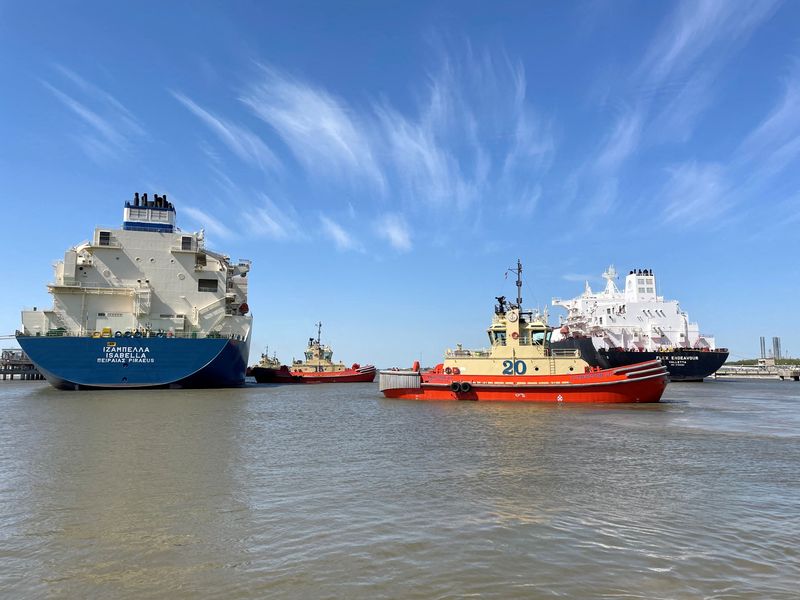By Valerie Volcovici and Nichola Groom
WASHINGTON (Reuters) - U.S. regulators raised doubts about Cheniere Energy (NYSE:LNG)'s decision to install higher-polluting gas-fired turbines at its Gulf Coast liquefied natural gas terminals in Texas and Louisiana years before they began operating, according to documents reviewed by Reuters.
The documents show that Cheniere, the top U.S. LNG exporter, may have had a chance to avoid its current struggle with looming federal limits on emissions of formaldehyde and other dangerous chemicals.
The Texas-based company could be forced to undertake outages that might reduce or slow gas shipments to make expensive upgrades, potentially wiping out any cost savings made a decade ago when it disregarded concerns from the U.S. Environmental Protection Agency.
In June, Reuters reported exclusively that Cheniere asked President Joe Biden's administration for an exemption from new curbs to be imposed later this year on emissions of cancer-causing chemicals like formaldehyde and benzene. The company said its gas-fired turbines are difficult to retrofit and such work could slow exports at a time of energy shortages in Europe.
The EPA said no other LNG exporter is seeking similar relief, and it is considering the request.
According to a Reuters review of previously unreported documents, EPA in 2013 questioned Cheniere's plans to install the gas turbines at its Corpus Christi Texas LNG terminal. The agency also suggested using cleaner electric technology being used or proposed by rivals like Freeport LNG.
"It will be extremely difficult for us to defend eliminating electric drive compressors for LNG liquefaction when that is what is proposed by Freeport,” a regional EPA official told the company.
EPA ultimately approved the permit after Cheniere said the electric technology was not yet proven and would require costly transmission upgrades and additional real estate.
Two years earlier, federal regulators had also questioned Cheniere’s plan to install gas turbines at its project in Sabine Pass, Louisiana, without add-on pollution controls such as oxidation catalysts that turn toxic pollutants into carbon dioxide.
Those controls would have helped Cheniere reduce emissions of formaldehyde, benzene and other hazardous pollutants from the turbines in line with the forthcoming limits. Gas turbines emit such chemicals by superheating methane.
Cheniere said its analysis of such controls had determined they were technically infeasible, according to the documents. The EPA did not object to the state issuing the permit.
The Corpus Christi facility started up in 2018 and the Sabine Pass facility started up in 2016.
At the time of these decisions, there was an open question about whether the government would regulate hazardous air pollutants from gas-fired turbines. The EPA first imposed the standard for stationary combustion turbines under the National Emissions Standards for Hazardous Air Pollutants in 2004. But it issued a “stay” temporarily excusing two types of gas turbines after business groups petitioned to keep them out of the regulation.
The EPA kept that stay in place for 18 years until February 2022, after environmental groups petitioned in court. Then, Biden’s EPA announced it would finally require operators to meet the standard.
Under the rule, these turbines must comply by September with an emissions limit of 91 parts per billion of formaldehyde. That level is meant to control other dangerous chemicals too.
Cheniere said its turbine technology was in compliance with air quality rules in place at the time they were proposed and it believes the EPA should exempt it from the emissions limits.
"The reversal of EPA’s position in 2022 is an unexpected shift in EPA’s process and statements on this rule over the last nearly two decades," said Cheniere spokesperson Eben Burnham-Snyder.
The EPA told Reuters in an emailed statement that it is “committed to reducing air pollution in a way that provides regulatory certainty and a long-term planning horizon for companies, regulators and investors.”
James Pew, a Sierra Club lawyer, said Cheniere "chose to gamble on the idea that they could get out of meeting these emission standards."
On Aug. 4, Cheniere said in a call with Wall Street analysts that it has been “working closely” with EPA to come up with a resolution. CEO Jack Fusco said the company has been testing the turbines to measure their emissions and will provide the data to the EPA by its Sept. 5 deadline.
“I think the solutions will be immaterial to Cheniere both from both an operational perspective and from a financial perspective," he said in the call.
Cheniere's message had a different tone in March, when the company's lawyers told EPA Administrator Michael Regan in a letter that compliance with NESHAP would impose "significant costs and operational disruption on the U.S. LNG industry at the same time the administration is focused on Europe’s strategic need to break its reliance on Russian gas."
Cheniere has sidestepped emissions curbs before. Previous Reuters reporting shows that the company gained a pass from Texas regulators for overshooting emissions limits on other pollutants.
“It seems that Cheniere is betting on receiving the exemption, knowing that the government has been lenient on numerous occasions in the past,” said Ryhana Rasidi, a gas analyst at KPLER.
“The decision will ultimately lie in the hands of the government to either approve or reject Cheniere’s request – which will have a direct impact on global gas prices over winter as it determines the supply available to the market. The big question, however, is whose interests will be prioritized.”
